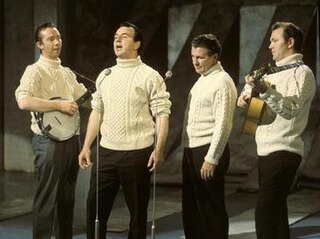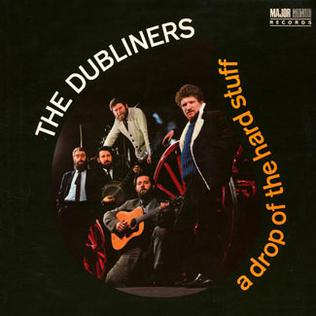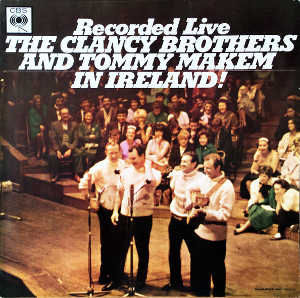"The Galway Races" is a traditional Irish song. The song's narrator is attending the eponymous annual event in Galway, a city in the west of Ireland. The song was made famous in the UK in 1967 by The Dubliners.
"The Galway Races" is a traditional Irish song. The song's narrator is attending the eponymous annual event in Galway, a city in the west of Ireland. The song was made famous in the UK in 1967 by The Dubliners.
"The Galway Races" has been recorded by a variety of artists, including:
"Whiskey in the Jar" is an Irish traditional song set in the southern mountains of Ireland, often with specific mention of counties Cork and Kerry. The song, about a rapparee (highwayman) who is betrayed by his wife or lover, is one of the most widely performed traditional Irish songs and has been recorded by numerous artists since the 1950s.

The Clancy Brothers were an influential Irish folk music group that developed initially as a part of the American folk music revival. Most popular during the 1960s, they were famed for their Aran jumpers and are widely credited with popularising Irish traditional music in the United States and revitalising it in Ireland, contributing to an Irish folk boom with groups like the Dubliners and the Wolfe Tones.

The Galway Races is an Irish horse-racing festival that starts on the last Monday of July every year. Held at Ballybrit Racecourse in Galway, Ireland over seven days, it is one of the longest of all the race meets that occur in Ireland.

Luke Kelly was an Irish singer, folk musician and actor from Dublin, Ireland. Born into a working-class household in Dublin city, Kelly moved to England in his late teens and by his early 20s had become involved in a folk music revival. Returning to Dublin in the 1960s, he is noted as a founding member of the band The Dubliners in 1962. The Irish Post and other commentators have regarded Kelly, known for his distinctive singing style and sometimes political messages, as one of Ireland's greatest folk singers.

Liam Clancy was an Irish folk singer from Carrick-on-Suir, County Tipperary. He was the youngest member of the influential folk group the Clancy Brothers, regarded as Ireland's first pop stars. They achieved global sales of millions and appeared in sold-out concerts at such prominent venues as Carnegie Hall and the Royal Albert Hall.
"The Patriot Game" is an Irish ballad with lyrics by Dominic Behan and a melody from the traditional tune "One Morning in May", first released in 1958.
"The Black Velvet Band" is a traditional folk song collected from singers in Ireland, Australia, England, Canada and the United States describing how a young man is tricked and then sentenced to transportation to Australia, a common punishment in the British Empire during the 19th century. Versions were also published on broadsides.

Crubeens are an Irish dish made of boiled pigs' feet. They are traditionally eaten by hand, like corn on the cob. The Irish singer Liam Clancy references them in a preamble to the song The Galway Races, and they are mentioned in the lyrics of some versions as an example of food available at a horse race. Crubeens can include the pigs' calves, and can be consumed fried, broiled, baked, or otherwise prepared.
Makem and Clancy was an Irish folk duo popular in the 1970s and 1980s. The group consisted of Tommy Makem and Liam Clancy, who had originally achieved fame as a part of the trailblazing folk group The Clancy Brothers and Tommy Makem in the 1960s. Makem and Clancy sang a combination of traditional Irish music, folks songs from a variety of countries, and newly written pieces, including compositions that Tommy Makem himself wrote. One reporter described their music as "more polished and varied than that used by the Clancy Brothers."
"I'll Tell Me Ma" is a traditional children's song. It was collected in various parts of the United Kingdom in the 19th century and again appears in collections from shortly after the turn of the 20th century. In Ireland, especially within Ulster, the chorus usually refers to Belfast city and is known colloquially as "The Belle of Belfast City", although it is also adapted to other Irish cities, such as Dublin. Other versions refer to the "Golden City" or "London City". This song is Roud Folk Song Index number 2649.
Tradition Records was an American record label from 1955 to 1966 that specialized in folk music. The label was founded and financed by Guggenheim heiress Diane Hamilton in 1956. Its president and director was Patrick "Paddy" Clancy, who was soon to join his brothers Liam and Tom Clancy and Tommy Makem, as part of the new Irish folk group, The Clancy Brothers and Tommy Makem. Liam Clancy designed the company's maple leaf logo. Columbia University Professor of Folklore Kenneth Goldstein was also involved in the early creation of the company, which operated out of Greenwich Village, New York, United States.
Diane Hamilton was the pseudonym of Diane Guggenheim, an American mining heiress, folksong patron and founder of Tradition Records.

A Drop of the Hard Stuff is the debut studio album of the Irish folk group The Dubliners. It was originally released in 1967 on Major Minor Records. When it was reissued, it was renamed Seven Drunken Nights after the first track became a hit single. The album reached number 5 in the UK album chart, and stayed in the charts for 41 weeks. The album cover provides biographical sketches of the band line-up: Ronnie Drew, Luke Kelly, Barney McKenna, Ciarán Bourke and John Sheahan. "Limerick Rake" is sung unaccompanied. Most of the songs concern rogues and drinking. "Weila Waile" is a tragic murder ballad, sung with a certain jollity.
"Weela Weela Walya", also called "Weila Waile", "Wella Wallia" or "The River Saile", is an Irish schoolyard song that tells the story of an infanticide in a light-hearted way. It was popularised in the 1960s by Irish folk bands The Dubliners and The Clancy Brothers.

Robbie O'Connell is an Irish singer songwriter who performs solo, as well as with The Green Fields of America. He also appears with Dónal Clancy (cousin), Dan Milner, and fiddler Rose Clancy. O'Connell has also toured and recorded with The Clancy Brothers, being their nephew. For over 20 years, he has conducted small cultural tours to Ireland with Celtica Music & Tours and, for more than ten years, WGBH Learning Tours. Married with four grown children, he now spends his time between Bristol, Rhode Island and Waterford.
"Foggy Dew" is the name of several Irish ballads, and of an Irish lament. The most popular song of that name chronicles the Easter Rising of 1916, and encourages Irishmen to fight for the cause of Ireland, rather than for the British Empire, as so many young men were doing in World War I.
"The Shoals of Herring" is a ballad, written by Ewan MacColl for the third of the original eight BBC Radio balladsSinging the Fishing, which was first broadcast on August 16, 1960. Ewan MacColl writes that the song was based on the life of Sam Larner, a fisherman and traditional singer from Winterton-on-Sea, Norfolk, England. Liam Clancy, who performed the song for decades, tells a more nuanced story, saying that MacColl "tape recorded all the old fisherman up along the east coast of England. And he never used one word of his own. ... He rhymed the lines that the fishermen had given him, and he made it into a song..."

Recorded Live in Ireland is a 1965 album of Irish folk songs performed by The Clancy Brothers and Tommy Makem. It was the first live album to be recorded in stereo in Ireland. It was their sixth LP for Columbia Records and, unusually for the group, included two newly composed songs in the folk style. Music critic Joe Goldberg wrote the liner notes.